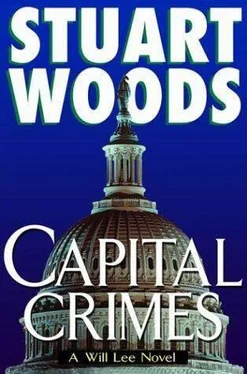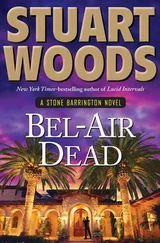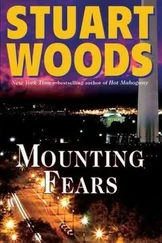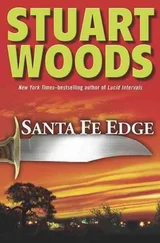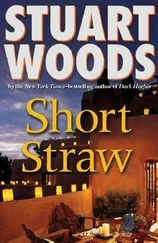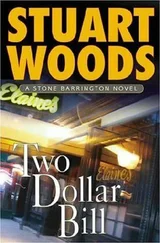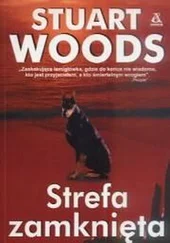A man spoke up. “Give me a drawing pad, and I’ll do one for you.”
Kinney motioned to the FBI artist who was sitting against the wall, and the man provided the materials.
“While you’re doing that, do any one of you have one or more photographs of Fay? Something taken at a reunion or a party?”
They all shook their heads.
“Do any of you have knowledge of Fay owning or having access to a second home? A cabin in the mountains, a house on Chesapeake Bay, anything like that?”
They all shook their heads.
“Wait,” one of them said. “He used to keep a boat at a yacht club in Annapolis. I had a conversation with him about it once.”
Kinney motioned Kerry Smith forward. “Would you please go with Agent Smith and tell him everything you know about it?”
The two men left.
“Do any of you have any other information of any kind that might help us locate Fay? Anybody with knowledge of family members or friends inside or outside the Agency that he might feel safe with or try to contact?”
A woman spoke up. “Teddy’s wife died several years ago. She was all he had. They were childless, and I’m pretty sure Teddy was an only child. He didn’t like her parents, so if they are still alive, he wouldn’t go to them.”
“Did any one of you ever take a vacation with Fay? A weekend sailing or hunting trip, anything like that?”
No one spoke.
“All right, I’d like the personal impressions of Fay of each of you in turn. May we start with you?”
He pointed to a woman.
“Brilliantly inventive, technically accomplished in many skills, very self-contained, tightly wound.”
She sat back and folded her arms.
“Did you ever work with him on assignments?”
“Many times.”
“Did any other personal characteristics stand out?”
She shook her head.
A man spoke up. “I worked with Teddy, oh, maybe a dozen times,” he said. “What Jean says is true. I also felt that he was an angry man, though I never knew about what.”
Another man spoke. “I’ll second that. He didn’t encourage knowing him. He always brought his lunch and ate it in the garden in warm weather and at his desk when it was cold. I don’t ever recall seeing him in the cafeteria, let alone lunching with anybody.”
“He was knowledgeable about investments,” another man said. “I was talking to someone about putting some money into a mutual fund on one occasion. Teddy overheard me and named three other funds he said were better, and he was right.”
“Did you have any idea of the extent of his own holdings?”
“No, he would never have talked about that.”
A woman spoke up. “You have to understand that Teddy wasn’t exactly an oddball in Tech Services. There were lots of people who would have seemed odd in other surroundings. Lots of us were freaks, techies, nerds, and bookworms.”
There was a chorus of agreement from the group.
“Does anyone have any inkling of where he might have gone when he disappeared?”
There was a moment’s silence, then a man spoke up. “You have to understand the work we did. Apart from the weapons-the bombs, the exploding fountain pens, the exotic firearms-what we did was to invisibly alter perceptions. We manufactured personalities, created documents, constructed legends-all the things that would make an agent or friend seem to be something other than what he was-and verifiably so. Teddy not only had access to all those techniques and equipment, he invented much of it. If he chose to disappear, then he would have done so in such a way that you could not find him. You would never think of looking for him where he went, and neither would I or anyone else here.”
Another murmur of agreement.
Another man spoke up. “You’ve got just one chance of finding him,” he said.
Kinney turned to face him. “Tell me.”
“If Teddy turns himself in.”
Kinney was still thinking about that when the artist shoved his drawing pad across the table to him. Kinney looked at it and saw a bland face with a slight smile, one that seemed nearly featureless. He turned the pad around and showed it to the group. “Is that Teddy Fay?”
There was a chorus of assents.
“Thank you all for coming,” Kinney said. “My secretary will give each of you my card, and should you think of anything else pertinent or, especially, if you should hear from Mr. Fay, please call me at once, day or night.”
He watched them file from the room, then looked again into the face of Teddy Fay-enigmatic to a fault.
KINNEY AND SMITH DROVE out to MacLean, Virginia, the following morning and presented their ID to a guard at the main gate of the Central Intelligence Agency. They were admitted, parked in a visitors’ spot, and walked into the main lobby, which was familiar to Kinney, with its memorial wall of dead agents, from various movies and magazine photographs. A middle-aged woman in a business suit was waiting for them.
“Agents Kinney and Smith?”
“That’s right,” Kinney replied. “Is it so obvious?”
“Yes, it is,” she said without smiling. “Would you please follow me?” She led them into an elevator, then inserted a plastic card into a slot and pressed an unnumbered button. The elevator seemed not to move for several moments, but then the door opened and they stepped into a hallway.
Kinney was not sure if they had gone up or down. He followed the woman, who had not mentioned her name, down a long hallway and into a conference room, where she asked them to wait. A few moments later a gray-haired man, apparently in his fifties, came into the room while struggling into his suit jacket.
“Agents Kinney and Smith?”
They rose and shook hands.
“Call me Gil,” the man said. He waved them to seats. “I’ve been instructed by the director to cooperate with your investigation, so I will answer any of your questions that seem relevant. I understand you want to know about Theodore Fay?”
“That’s correct,” Kinney replied. “We want to know everything you can tell us about him.”
“Of course, I wanted to print out his employment record for you, but as you’re now no doubt aware, it has been removed from our computer files, and there is, apparently, no hard copy.”
“Yes, we know about that. What can you tell us about the nature of his employment here?”
“I understand you already have the personal recollections of some of our people who are retired.”
“That’s correct.”
“They would have known Teddy as well or better than I, so I’ll tell you what I know about what he did here until his retirement.”
“Thank you, that would be very helpful.”
“I must ask you to treat everything I tell you as secret and not to share this information with anyone not directly connected to your investigation. I would also prefer it if you would not make written notes of our conversation or include them in any reports circulated to your own people or others.”
“We understand your need for secrecy,” Kinney replied, “and we’ll do everything we can to keep your confidence.”
“Thank you. First, let me give you an overview of the kinds of things we do here. Our Department of Technical Services is divided into, roughly, four segments: weapons, both offensive and defensive, including firearms and various others; chemical, again both offensive and defensive, including explosives and poisons; communications, including radios and computers; and documents, including manufacture of same, as well as analysis of found materials. Our capabilities in all these areas are far beyond those of any police department in the world, and very probably, well beyond those of your own FBI labs.”
“In which areas did Teddy Fay work?” Kinney asked.
Читать дальше
